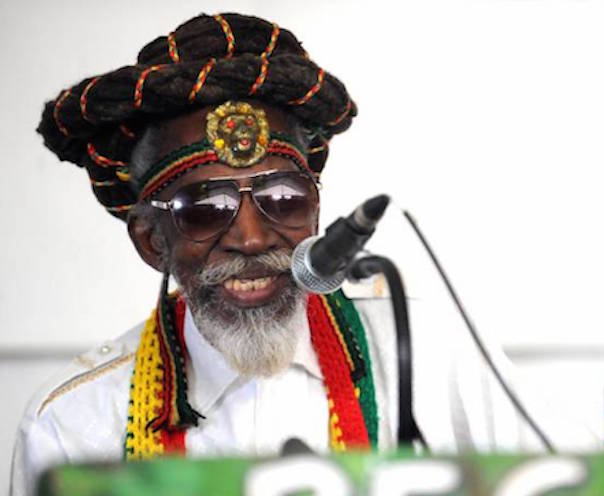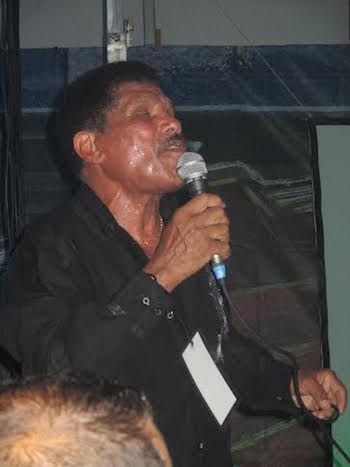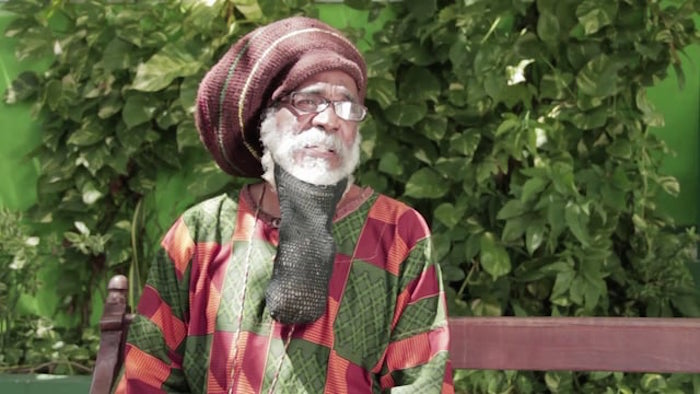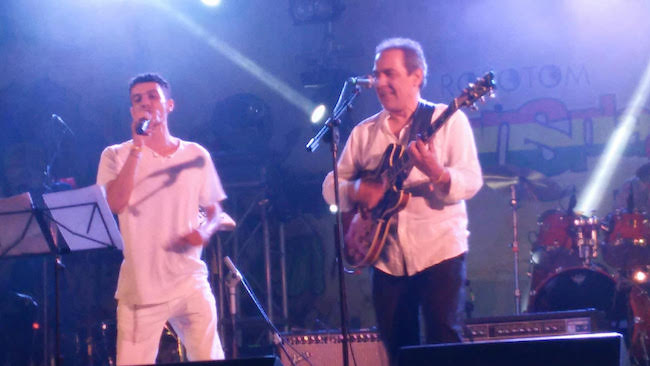Music Review: Spain’s Rototom Sunsplash — Bad Politics and Good Music at Major Reggae Fest
This year’s fiasco at Rototom Sunsplash proved that political energies can drive great art but have no place when it comes to programming and curation.

The venerable Bunny Wailer at Rotatom Sunsplash 2015. Photo: Luca Sgamellotti © Rototom 2015
By Noah Schaffer
Over 22 years and a change of countries, the Rototom Sunsplash festival has built up a lot of goodwill. It’s been earned not just because of its thoughtful curation of eight nights of reggae heroes past and present, but through its in-depth look at the breadth of reggae culture. One can take dancehall lessons on the beach at noon, see a luminary like Bunny Wailer interviewed at a Reggae University panel, catch the screening of a documentary film, hear insights from a resident Rastafarian elder, and then wrap it all up by being blasted by the giant subwoofers at the Dub Academy until 6 in the morning.
In the spirit of reggae’s traditional role as a vehicle for political expression, Rototom also offers two things unimaginable at any American music festival with a six-figure attendance: an absence of corporate sponsorships and a Social Forum where heavy hitters engage in dialogues about topics like Islamophobia, Guantanamo Bay, and the environment.
Unfortunately, last month’s edition of the festival earned international attention because of its bizarre behavior: the botched cancellation and then subsequent rebooking of the Jewish-American dancehall rapper Matisyahu. The former Hasidic’s approach to music is generally apolitical (to the point of being downright bland). But his past of sometimes incoherent pro-Israel statements and performances for pro-Israel organizations raised the ire of a local chapter of the BDS (Boycott, Divest, Sanction) pro-Palestinian movement.
At first, Rototom responded with a thoughtful statement stressing the need for constructive dialogue. But once BDS activists persuaded five minor bands and panelists to withdraw from the festival, Matisyahu was given an ultimatum: make a statement supporting Palestinian statehood or leave.
Matisyahu declined and was dropped from the bill, which predictably sparked even a greater uproar. The litmus test reeked of anti-Semitism because no other artist — including several headliners who had performed in Israel — had been forced to make any kind of political statement in order to perform. Making matters worse — the presence at the festival of a convicted rapist (Jah Cure) and a notorious homophobe (Capleton).
Finding itself subject to criticism from the Spanish government, Rototom reversed itself (yet again) and reinvited Matisyahu. The artist — who would have probably been paid his full fee regardless — agreed to perform. He was mostly well received, aside from a few vocal Palestinian flag wavers and some who tossed bottled water and shoes.

Singer Winston Francis — he served up hits from his past. Photo: Noah Schaffer.
The fiasco proved that political energies can drive great art but have no place when it comes to programming and curation. Alas, the hoo-ha overshadowed many of the artistically rewarding moments in the festival. Wailer went back to his roots with a memorable ska-filled set. The Pioneers, a ’60s and ’70s group which helped break reggae internationally, Studio One vet Winston Francis, and ’80s dancehall giants Barrington Levy, Brigadier Jerry, and Josey Wales turned back the years with lively renditions of their greatest hits. Clinton Fearon, a former member of Jamaican greats the Gladiators, brought his Seattle-based Boogie Brown band and showcased his strong songwriting and creative arrangements.
The most impressive set, because of its inventiveness, came from the Alberto Tarin Jazz & Reggae Band. Guitarist Tarin took the jazz-reggae sound pioneered by Ernest Ranglin and applied it to rearrangements of classic salsa numbers, powered by the excellent vocalist Payoh Soul Rebel. It was rooted in Jamaican tradition yet totally refreshing at the same time.
Other original voices: Hollie Cook, the daughter of Sex Pistols’ drummer Paul Cook, whose tender voice juxtaposed nicely with her band’s heavy dub moments; Poland’s Habakuk, who added not just traditional folk instruments but a women’s choir to his mix.
Two of reggae’s most important producers appeared on stage with differing results. Bunny Lee has been enjoying a significant resurgence lately, in part thanks to the documentary I Am the Gorgon. His recently created sound system found him spinning his classic records and their reinterpretations until 6 in the morning while he provided a steady stream of delightful commentaries over the vinyl.
Lee “Scratch” Perry’s success with experiments in the studio have made him a key figure in the history of popular music. He has been frequently on tour recently; in his act he chants enigmatic lines while a backing band vamps. It’s a recipe for wildly uneven performances, and at Rototom most of the audience members snapped a picture of the legend with their cell phones and then departed to other stages. The rapidly thinning crowd had previously been eating out of the hand of British deejay Macka B, a smart and funny lyricist who offered a topical ode to the “Medical Marijuana Card” and decried digital listeners who never play a 45.

A scene from the documentary “Dreadlocks Story.”
A new documentary screened at the festival, “Lee ‘Scratch’ Perry’s Visions of Paradise, was as inconsistent as the man’s live set. Perry has already been the subject of an exhaustive documentary. Perhaps, in order to distinguish itself, the new effort decided to accompany Perry’s mystical commentaries with animations. It’s surprisingly effective, but the film is weighed down by scores of talking head interviews and an unsatisfactory biographical narrative.
Two other documentaries screened at the festival, as well as a panel about a forthcoming film, shared the same happy theme: Jamaica’s rebirth as a destination place for artists from outside the country to come and record. In the ’70s, stars like Paul Simon and Eric Clapton made hits in Jamaican studios; today, technology gives artists from around the world valuable opportunities to quickly and inexpensively collaborate with Kingston talent.
The documentary Congo Beat the Drum follows the journey of Israeli rub-a-dub aficionados who track down and create new beats for their inspirations. Kingston Crossroads kicks off with the tale of a German reggae performer who moves to Jamaica’s capitol and finds himself caught up in the recent “reggae revival” movement. Paired with that narrative is a more powerful story of a Jamaican immigrant in America who finds himself deported back to the island. He has to grapple with making a new life for himself after decades away. A forthcoming Dub Files documentary and album was discussed by the Italian roots reggae preservationists Mellow Mood and Paolo Baldini.
The most insightful film that I saw at Rototom was Dreadlocks Story, which explores the surprising but undeniable connection between the trademark Rastafarian hairstyle and Indian mystics. Once dreads were routinely persecuted, but today mainstream professionals sport locks in their hair. Cannabis is quickly traveling a similar path toward respectability. The question is whether the growing legalization of marijuana around the globe will benefit the country’s small farmers or if, like bauxite, it will be a Jamaican resource that will be ripped off for foreign consumption and profit.
In his Reggae University appearance at Rototom, Bunny Wailer’s manager Maxine Stowe urged attendees to boycott ‘Marley Natural’ cannabis, insisting that the reggae icon’s estate was only out for profit and not to uplift the Rastafarian community. Ras Flako, who gave nightly House of Rastafari presentations at the festival, echoed those concerns, while at the same time noting that Rastafarian ganja farmers who are passionately anti-“Babylon” will have to work with the Jamaican government in order to formulate a plan to have their cannabis legally harvested and sold.

Alberto Tarin Jazz & Reggae Band played a very impressive set. Photo: Noah Schaffer.
While much attention has been rightfully paid to the exciting multi-disciplinary creativity coming out of the “reggae revival” movement in Kingston, this year’s lineup at Rototom suggested that, Chronixx aside, when it comes to box office appeal young non-Jamaican roots bands are faring the best. In fairness, most of the top reggae revival acts have played earlier editions of Rototom, but it was hard to ignore that only Protoje and Uprising Roots Band represented the modern Jamaican roots sound, and that Jamaican artists made up less than half of the main stage lineup.
Why do so many college-aged listeners flock to well-intentioned but tepid groups like California’s SOJA and New Zealand’s Katchafire? Their jam-oriented grooves are surely part of the attraction. And perhaps their quasi-spiritual lyrics resonate more with a youngish crowd than those offered by newer Jamaican roots artists, who take on more specific issues, such as whether the land that once housed the historic Rastafarian commune Pinnacle should be turned over to foreign developers.
In Boston, SOJA routinely fills the giant House of Blues, while Jamaican upstart and Pinnacle activist Kabaka Pyramid’s recent show at Cambridge’s tiny Middle East Upstairs did not attract a capacity audience.
But at least one Jamaican great wasn’t fretting about the influx of outside bands. When queried about the topic at a Rototom press conference, Barrington Levy said wider interest in Jamaican music can only help to boost interest in the country that gave birth to the sound. Anytime someone listens to reggae, enthused Levy, “it’s good for Jamaica.”
Over the past 15 years Noah Schaffer has written about otherwise unheralded musicians from the worlds of gospel, jazz, blues, Latin, African, reggae, Middle Eastern music, klezmer, polka and far beyond. He has won over ten awards from the New England Newspaper and Press Association.

Thank so much for the cool review of our set. On behalf of the Alberto Tarin Reggae and Jazz Band.
Reggae music was never about running down crowds and trying to accommodate what people want to hear – your metrics for judging success are different than Jamaicans.